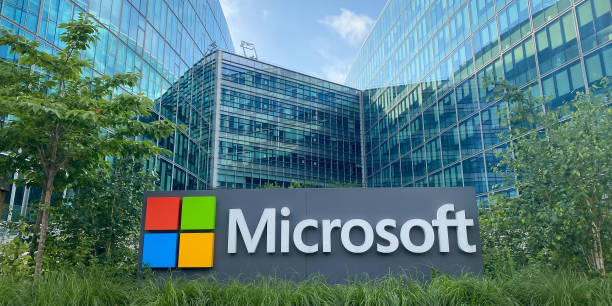Introduction
Microsoft Corporation stands as a pillar in the technology sector, not only due to its innovative products but also through its robust stock performance. This article delves into the dynamics behind Microsoft’s share price, providing a historical overview, examining influential factors, and exploring future trends.
Historical Overview
Microsoft’s journey on the stock market began when it went public in March 1986. Initially priced at $21 per share, the stock has undergone multiple splits and substantial growth phases, underlining its long-term value for investors.
Factors Influencing Microsoft’s Stock Price
Several factors contribute to the fluctuations and trends in Microsoft’s stock price:
Economic Conditions
Microsoft’s financial performance often mirrors broader economic conditions. During economic booms, the company tends to perform well, as businesses and consumers increase spending on technology.
Technological Advancements
Innovation is a significant driver of Microsoft’s stock. Product launches, such as new versions of Windows, Office, or entry into new markets like AI and quantum computing, typically generate investor interest.
Market Competition
The intensity of competition in the tech industry, from giants like Apple and Google to numerous startups, constantly challenges Microsoft. Its ability to maintain a competitive edge is crucial for its stock valuation.
Regulatory Environment
Regulations related to data privacy, cybersecurity, and antitrust issues in different countries can impact Microsoft’s operations and, subsequently, its stock price.
Recent Trends
Several recent developments have particularly influenced Microsoft’s stock price:
Cloud Computing Growth
The rapid growth of cloud computing has been a boon for Microsoft, with its Azure platform experiencing exponential growth, positively affecting its stock.
Future Outlook
Looking ahead, Microsoft appears well-positioned to continue its growth, supported by its strong presence in cloud computing and ongoing expansions in technology.
Investment Recommendations
For potential investors, Microsoft presents a viable long-term investment opportunity, particularly for those looking at stable returns in the technology sector.
Detailed Factors Influencing Microsoft’s Stock Price
Economic Conditions
Microsoft’s financial health is often reflective of broader economic trends. In periods of economic growth, both corporate and consumer spending on technology tend to increase, which boosts Microsoft’s revenue from its diverse range of products and services. Conversely, during recessions, the company might face challenges; however, its diversified business model helps mitigate the impacts as compared to more niche players in the technology sector.
Technological Advancements
The core of Microsoft’s stock value is driven by continual innovation. Each major release, whether it’s an upgrade to their operating systems, productivity software, or expansion into cutting-edge areas like artificial intelligence and mixed reality, has the potential to significantly impact the stock price. Investors typically respond positively to innovation that promises to expand market share or open new markets.
Market Competition
Microsoft operates in a highly competitive environment. Its main competitors include large tech companies like Apple, Google, and Amazon, particularly in areas like cloud computing and personal computing devices. The strategies Microsoft employs to outmaneuver or outperform these competitors are crucial. Successful innovations or winning lucrative contracts can give Microsoft an edge, boosting investor confidence and stock prices.
Regulatory Environment
As a global technology leader, Microsoft must navigate a complex web of international regulations. Changes in data protection laws, antitrust rulings, and intellectual property rights can all pose risks to its business operations. For example, hefty fines or restrictions from antitrust lawsuits can affect profitability and, consequently, stock prices.
Cloud Computing Growth
Microsoft Azure, the company’s flagship cloud computing service, has seen explosive growth and is a significant driver of the company’s valuation. As businesses move more of their operations to the cloud, they rely increasingly on Azure for solutions that offer scalability, security, and compliance. The ongoing expansion in the cloud sector is likely to continue bolstering Microsoft’s financial performance.
Future Outlook and Investment Recommendations
Looking ahead, Microsoft is well-positioned to capitalize on the ongoing digital transformation across all sectors of the global economy. Its continued investment in cloud infrastructure, enterprise services, and consumer technology development, such as gaming and personal computing, suggests a promising outlook.
Investment Recommendations
For investors, Microsoft represents a potentially robust long-term investment. Its strong market position, continuous innovation, and solid financials make it attractive for those seeking growth, stability, and reasonable risk. As with any investment, it’s crucial to consider current market conditions and individual financial goals.
Conclusion
Microsoft’s stock has not just survived but thrived through various market conditions and economic cycles, reflecting its robust business model and innovative approach. As technology continues to evolve, Microsoft is expected to remain at the forefront, making it a key player in the stock market.
FAQs
Q. What was Microsoft’s initial public offering price?
A. Microsoft’s IPO price was $21 per share in March 1986.
Q. How does Microsoft’s performance in the cloud sector affect its stock?
A. Growth in the cloud sector, particularly Azure, has positively influenced Microsoft’s stock price due to increased revenue streams.
Q. What impact do economic downturns have on Microsoft’s stock?
A. During economic downturns, Microsoft’s stock might experience short-term declines, but historically, it has shown resilience and capacity for recovery.
Q. Can regulatory changes significantly impact Microsoft’s stock?
A. Yes, regulatory measures, especially those related to antitrust laws and data privacy, can influence Microsoft’s operational landscape and affect its stock.
Q. Is Microsoft considered a good long-term investment?
A. Given its market position, innovation, and financial health, Microsoft is generally regarded as a strong long-term investment.

